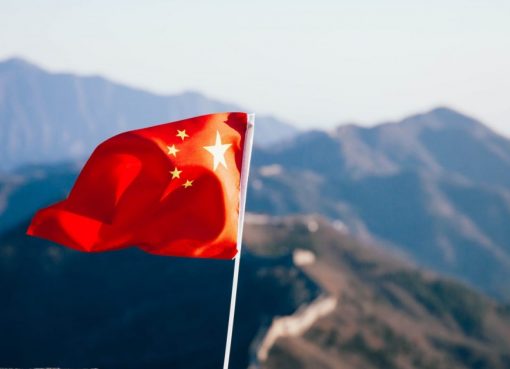- China’s blockchain infrastructure BSN is set to provide global access to its services next month.
- The network’s reliance on U.S. cloud service providers makes it vulnerable to geopolitical risks.
- Rising tension between the U.S. and China over the last several months could increase such risks.
- China’s developments in other technology areas have already met with resistance from the U.S. government.
A state-backed blockchain infrastructure project from China aims to be the dominant internet services provider for decentralized applications (dapps). Its first-mover advantage is significant, as are the geopolitical risks.
The project, called the Blockchain-based Service Network (BSN), is expanding globally as U.S.-China relations become increasingly tense. BSN is a Chinese state-sanctioned blockchain project, but few may realize the network is supported by U.S. technology companies.
Amazon Web Services (AWS), Microsoft and Google are among the major cloud service providers for BSN’s overseas data centers.
This arrangement is notable, given the U.S. government’s hawkishness on Chinese technology. The Trump administration is considering a ban on Chinese social media app Tik Tok, Congress approved $1 billion for rural telecom carriers to ditch services from Huawei and the U.S. Commerce Department restricted semiconductor companies from providing chips to Huawei.
At Wednesday’s House antitrust hearing, Facebook CEO Mark Zuckerburg painted the China-U.S. tech competition as a zero-sum game. According to Zuckerberg, “China is building its own version of the internet focused on very different ideas, and they are exporting their vision to other countries.”
This charged environment could potentially spell trouble for BSN. “China tries to grab the lead in blockchain and dominate this domain and that may end up putting this BSN project further into the spotlight of the U.S.-China tech competition,” said Paul Triolo, practice head of geotechnology at Eurasia Group.
“This would be the perception in places like Washington,” he added.
U.S.-China technology competition has been ongoing for decades, but the focus is shifting from search engines and social media to more fundamental levels of technology like telecom equipment provided by Huawei, Triolo said.
Tension between the U.S. and China reached fever pitch earlier this month as the U.S. shut down the Chinese consulate in Houston and China took over the U.S. consulate in Chengdu in retaliation. In a recent speech, U.S. Secretary of State Mike Pompeo slammed U.S.-China engagement as a failure.
It’s unclear whether these tensions will calm in the near future, even if a new U.S. president is elected.
“Even if we get a new administration in the U.S., for example, under [former Vice President and Democratic nominee Joseph] Biden, there is still going to be a lot of scrutiny on China from the technology front,” Triolo said.
There is a real risk that technology that doesn’t present a national security risk will nonetheless be banned because of politics, said Graham Webster, China digital economy fellow at New America, a think-tank with a focus on public policy issues.
Amazon, Google and Microsoft did not return requests for comment by press time.
Containment
One way to limit Chinese tech companies from growing and developing global services is to pressure their suppliers to sever ties with them.
The U.S. prohibited Huawei’s major provider – Taiwan Semiconductor Manufacturing Company (TSMC) – from using American tools to make chips if it produces any product for Huawei. The Chinese company denounced the move as a “pernicious decision.”
BSN could potentially end up in a similar situation, given the prominence of American firms as its overseas data center hosts.
The Chinese network does not build or own any of the data centers where it runs its technical infrastructure; 90% of BSN’s domestic data centers are provided by the telecom company China Mobile. Most overseas data centers will be provided by Amazon’s AWS, given the scope of the cloud services provider’s operations across the globe, according to BSN.
BSN pays these cloud services providers to use their servers and integrates the servers with their software.
The network has two data centers hosted by AWS in China. It also uses a few global data centers built on Microsoft’s cloud computing arm and Google Cloud Platform. BSN has one data center from Google Cloud based in Tokyo, one from Microsoft in Johannesburg and two from AWS in Paris and California.
Dapp developers can more quickly and easily access services from BSN if they use a data center that is physically close to them. That’s why overseas data centers are crucial in terms of providing internet services for the global blockchain community.
“If I were the Chinese company, I would be careful about setting up a system that really depends on continued services in the U.S.,” Webster said. “Anybody who wants to use the global version of this Chinese network should take into account the risk that a data center in the U.S. could get taken off the network because of geopolitics.”
One motivation for curbing Chinese tech companies’ global expansion is data security concerns.
Blockchain technology clearly provides a structurally unusual level of security and integrity, but there is a battle going on over data localization and cloud services, said James Mulnevon, director of intelligence integration at SOS International, a Washington, D.C.-based defense and intelligence company that supports U.S. government agencies.
“The world is clearly becoming a ‘splinternet’ with national boundaries and domestic regulations overturning the previous ‘techno globalism’ motif,” Mulnevon said.
U.S. cloud providers offer services to a wide range of clients and it is hard to tell what specific cyber security concerns would exist if they allow Chinese companies to use their services, Webster said.
No immediate threat
So far, BSN’s global expansion has not met with challenges from U.S. regulators, perhaps because it is relatively new. Or maybe it’s just that few Washington lawmakers can actually make sense of it.
“Part of the reason that BSN has not met with challenges from the U.S. policy makers as the other emerging technologies such as 5G and artificial intelligence is that blockchain technology is not well understood,” Triolo said.
The U.S. government is considering restricting Chinese cloud services companies from operating in the U.S., but has yet to address the question of U.S. companies hosting applications that have a China connection.
Last May, the Federal Communications Commission (FCC) denied China Mobile’s application to operate telecommunications services in the U.S. This could mean Chinese businesses trying to build cloud-based networks in the U.S. need to be aware of the geopolitical risk, said James Mulvenon, director of Intelligence Integration at SOS International, a DC-based defense and intelligence firm.
“I would be wary about big investments in these kinds of transnational cloud networks because regulators seem very grumpy about them right now,” Mulvenon said.
Lawmakers who do have concerns might be reassured by the fact that even if the Chinese government does ask for data from BSN nodes hosted overseas, it may not be able to get it.
The Chinese government has a very expansive view of extraterritoriality, Mulnevon said.
“The Chinese government certainly believes that Chinese companies operating abroad (even when they are incorporated abroad) are subject to Chinese law,” he said.
Theoretically, the Chinese government would solicit data from a Chinese company like the one behind BSN regardless of where it is run, meaning it could ask for data stored in the network’s overseas data centers. However, Red Date, the tech firm that architected BSN’s technical framework, has claimed the network does not have access to user data, due to its technical structure.
Red Date CEO Yifan He previously told CryptoX that BSN’s technical framework fully protects its users’ data privacy and functions like an adapter that better connects developers with data centers where they can run nodes and build applications. He even invited skeptics to examine the network’s code for themselves.
The China connection
The BSN Development Association is led by the State Information Center of China (SIC), a public institution under the National Development and Reform Commission (NDRC), the highest economic planning committee in China. State-owned tech conglomerates China Mobile and China UnionPay are also deeply involved in building the network.
It is certainly rare to get a government affiliate to endorse and lead the effort for a large-scale blockchain infrastructure, and for two of the largest Chinese tech giants to support the network. However, unlike China’s national digital currency, higher-level government agencies such as the Chinese central bank and the Ministry of Industry and Information Technology of China (MIIT) do not appear to be involved in BSN yet.
The precise nature of the relationship between the Chinese government and BSN is not clear. But given BSN’s state connection, its reliance on major U.S. cloud services providers could be a point of contention on the Chinese side as well.
“No foreign firms sit on any BSN leadership committees. As stated in official documents, Beijing intends for BSN to be a ‘global infrastructure network autonomously innovated by Chinese entities,’” according to a May report from Eurasia Group.
The leader in blockchain news, CryptoX is a media outlet that strives for the highest journalistic standards and abides by a strict set of editorial policies. CryptoX is an independent operating subsidiary of Digital Currency Group, which invests in cryptocurrencies and blockchain startups.




